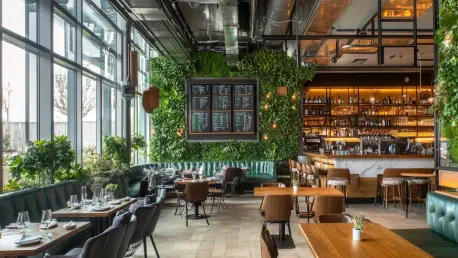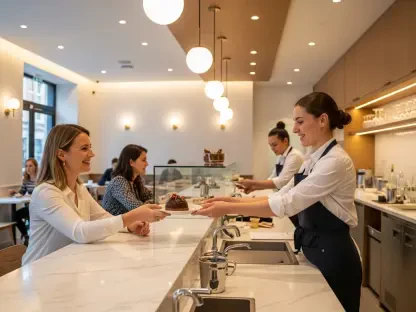By the year 2025, the hospitality industry is poised to experience transformative changes driven by sustainability, a fundamental shift from previous trends where ecological considerations were often treated as optional luxuries rather than necessities. This shift towards sustainable design is not just about adopting greener practices, but about redefining the core values of hospitality to address significant global challenges like climate change, social inequality, and the increasing demand for responsible consumption. Hoteliers and designers are now focusing on creating environments that are both environmentally sustainable and socially inclusive, ensuring spaces are genuinely accessible and beneficial for all.
Embracing Genuine Sustainability
Sustainability in hospitality design is emerging as a non-negotiable pillar that influences every aspect of creating and maintaining spaces. This evolution entails sourcing eco-friendly building materials, designing modular structures to minimize waste, and incorporating energy-efficient systems. Hoteliers are driven not only by the need to reduce their carbon footprint but also by the imperative to contribute positively to local communities and global challenges. Consequently, principles of universal design are gaining prominence, ensuring that hotel spaces cater to guests of all abilities, ages, and cultural backgrounds. This inclusive approach promotes sustainability through the lens of social responsibility, making sure that everyone can participate and benefit from the hospitality experience.
Furthermore, the focus on well-being is paramount, with designs that prioritize the health and comfort of guests and staff alike. Biophilic design elements, such as integrating natural light, greenery, and natural ventilation, are increasingly influential. These features not only reduce dependency on artificial lighting and air conditioning but also enhance mental and physical well-being. In essence, sustainable design is morphing hospitality spaces into symbols of modern progress, where comfort, sustainability, and inclusivity are interwoven to create truly enriching environments.
The Rise of Realism in Design
A noticeable trend in hospitality design is the movement towards realism, defined by simplicity, material authenticity, and a departure from overly ornate aesthetics. This approach, driven by a ‘less but better’ philosophy, focuses on the essence of materials, emphasizing raw, organic textures and minimalist constructions. For hoteliers, adopting this trend means curating spaces that feel grounded and trustworthy while maintaining a sense of elegance and functionality. By embracing timeless design principles, hotels can offer an environment that remains appealing and relevant over time, a crucial aspect of sustainability.
In this context, the use of durable, natural materials like stone, wood, and metal comes to the forefront, providing a sense of stability and permanence. Spaces designed with these materials offer a respite from the fast pace of modern life, allowing guests to reconnect with simpler, more tactile experiences. This authenticity caters to a growing demographic of travelers who seek genuine, unpretentious environments that reflect a sense of place and heritage. Ultimately, realism in design aligns with the broader goals of sustainability by fostering a deeper connection to the environment and promoting the use of resources that stand the test of time.
Celebrating Individuality and Creativity
As the desires of Millennial and Gen Z travelers continue to shape the industry, hospitality design is increasingly embracing individuality and creativity. Today’s travelers are looking for spaces that not only provide comfort but also reflect their personal identities and aspirations. This demand is driving designers to craft interiors with bold and daring aesthetics, incorporating vibrant color palettes, dynamic patterns, and playful layouts. Such environments do more than just appeal to the eye – they inspire, intrigue, and foster a sense of uniqueness and personal connection.
This push towards personalization and creativity is also evident in the use of adaptable furniture and statement pieces designed to spark conversation and engagement among guests. The incorporation of versatile, multi-functional elements enables spaces to transform and cater to various needs and activities, from social gatherings to quiet reflection. These creative design solutions resonate particularly well with younger travelers who value experiences and environments that feel personalized and meaningful. By prioritizing individuality, hoteliers can create memorable and inspirational settings that stand out in the competitive hospitality landscape.
Technological Integration and Innovation
Technological advancements are revolutionizing hospitality design, blurring the boundaries between physical and digital spaces to create immersive, otherworldly experiences. AI-driven generative designs, interactive surfaces, and digital aesthetics are now central to designing cutting-edge hospitality environments. These technologies enable the creation of highly customized and adaptable spaces that respond to the needs and preferences of guests in real-time, enhancing both functionality and user experience.
In addition to enhancing guest experiences, technology also plays a crucial role in promoting sustainability. Innovations such as solar-powered lighting, responsive building materials, and smart energy management systems contribute to significant reductions in resource consumption and environmental impact. For example, hotels can now use IoT (Internet of Things) devices to monitor and optimize energy usage, ensuring that lights, heating, and cooling are used only when necessary. These adaptive designs not only reduce operational costs but also underline a commitment to ecological responsibility, aligning with the broader trend towards a sustainable future in hospitality.
A Collaborative Vision for the Future
By 2025, the hospitality industry is expected to undergo significant changes, driven by a newfound focus on sustainability. In the past, ecological considerations were often seen as optional luxuries rather than essential elements. This new shift towards sustainable design entails more than just adopting green practices; it involves redefining the core values of hospitality to confront major global issues such as climate change, social inequality, and the rising demand for responsible consumption.
Today, hoteliers and designers aim to create spaces that are environmentally sustainable and socially inclusive. This means ensuring that their spaces are accessible and beneficial for everyone, promoting fairness and inclusivity. The industry’s transformation is not just a trend but a fundamental change in how hospitality is approached, with a strong emphasis on addressing pressing global challenges. As we move into the future, the hospitality sector will play a pivotal role in promoting sustainability and social equity, ultimately leading to a more responsible and inclusive industry.









